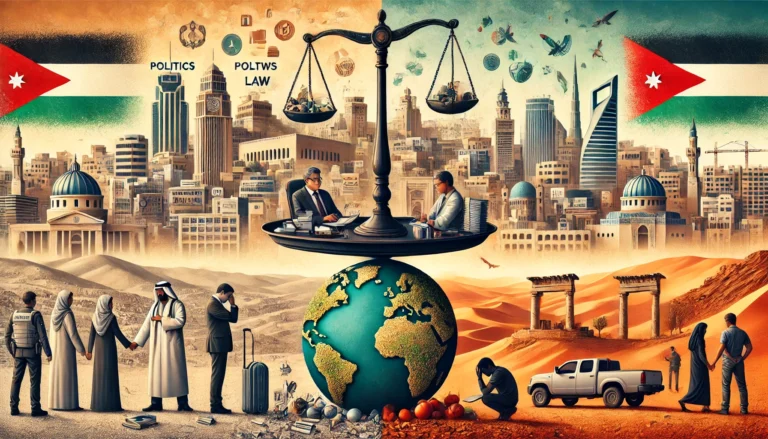Jordan, a relatively stable country in the Middle East, has been praised for its security and diplomatic efforts. However, like any nation, it faces several challenges across various sectors, including politics, law, business, healthcare, education, and the environment. This article explores the most common complaints in Jordan and their impact on daily life.
1. Political Complaints in Jordan
Despite Jordan’s stability, political complaints persist, particularly regarding governance and freedoms.
- Limited Political Participation: While Jordan has a parliamentary system, real political power remains concentrated with the monarchy, leading to dissatisfaction among political activists.
- Corruption and Bureaucracy: Transparency International reports ongoing issues with corruption in government institutions, particularly in public sector hiring and contracts.
- Restrictions on Freedom of Speech: Journalists and activists face legal action under cybercrime laws, limiting press freedom and political expression.
- Election Concerns: Some opposition groups claim that parliamentary elections lack transparency and fairness.
Source: Transparency International, Freedom House
2. Legal Complaints in Jordan
Jordan’s legal system is relatively developed but still faces inefficiencies and concerns about fairness.
- Slow Judicial Processes: Many cases take years to be resolved due to bureaucratic delays.
- Selective Law Enforcement: Some citizens believe that laws are not applied equally, with political and business elites receiving preferential treatment.
- Strict Cybercrime Laws: New internet regulations have been criticized for restricting free speech and personal expression online.
- Labor Law Issues: Many workers complain about unfair dismissal and lack of labor protections, especially in private sector jobs.
Source: Amnesty International, Jordanian Bar Association
3. Business Complaints in Jordan
Despite being a regional hub for trade and tourism, Jordan’s business environment faces several challenges.
- High Taxes and Cost of Living: Business owners and citizens struggle with rising taxes, inflation, and high operational costs.
- Unemployment Rates: Many young graduates struggle to find suitable jobs due to a mismatch between education and market needs.
- Bureaucratic Barriers: Business owners report difficulties in obtaining permits and dealing with government regulations.
- Foreign Investment Challenges: While Jordan seeks foreign investment, bureaucratic delays and economic instability deter investors.
Source: World Bank, Jordanian Chamber of Commerce
4. Health Complaints in Jordan
Jordan’s healthcare system is one of the best in the region but still has significant shortcomings.
- Overcrowded Public Hospitals: Many government hospitals suffer from overcrowding and limited resources.
- High Cost of Private Healthcare: While private hospitals offer better services, many citizens cannot afford the high fees.
- Shortages of Essential Medicines: Certain chronic disease medications and specialized treatments are often unavailable.
- Medical Malpractice Cases: Reports of misdiagnoses and errors in treatment have increased in recent years.
Source: World Health Organization (WHO), Jordanian Ministry of Health
5. Social Complaints in Jordan
Jordanian society faces several social challenges, particularly related to equality and public services.
- Gender Inequality: Women face legal and societal challenges in employment, inheritance, and family law.
- Public Transport Deficiencies: Many citizens complain about the lack of efficient and affordable public transportation.
- Housing Crisis: Increasing rent prices and property costs make homeownership difficult for many young Jordanians.
- Refugee Impact on Public Services: The large influx of Syrian refugees has placed pressure on infrastructure, schools, and healthcare services.
Source: UNHCR, Jordanian National Institute of Statistics
6. Educational Complaints in Jordan
Jordan has a strong education system, but students and educators report several concerns.
- Overcrowded Public Schools: Many schools lack sufficient resources and staff to accommodate rising student numbers.
- University Tuition Costs: Higher education is becoming increasingly expensive, making it inaccessible for many families.
- Mismatch Between Education and Job Market: Many university graduates struggle to find jobs related to their fields of study.
- Bullying and School Violence: Reports of bullying in schools have increased, raising concerns about student safety.
Source: UNESCO, Jordanian Ministry of Education
7. Environmental Complaints in Jordan
Jordan is one of the most water-scarce countries in the world and faces additional environmental challenges.
- Water Shortages: Many households experience frequent water cuts due to the country’s limited water resources.
- Air Pollution: Increasing urbanization and traffic congestion contribute to poor air quality in major cities.
- Waste Management Issues: Some areas struggle with garbage collection and illegal dumping.
- Deforestation and Desertification: Climate change and urban expansion are reducing Jordan’s green spaces.
Source: Jordanian Environmental Protection Agency, Greenpeace
8. Emotional Complaints in Jordan
Mental health issues in Jordan are becoming more prevalent, yet they remain stigmatized.
- Mental Health Stigma: Many people hesitate to seek professional help due to social stigma surrounding mental health issues.
- Increase in Anxiety and Depression: Economic stress, unemployment, and social pressures contribute to rising mental health concerns.
- Family Conflicts: Traditional expectations and financial struggles often create tension within families.
- Workplace Stress: Many employees complain about high stress levels, low wages, and lack of career growth opportunities.
Source: WHO, Jordanian Mental Health Association
Conclusion
While Jordan remains one of the most stable countries in the region, it still faces significant challenges in governance, economic development, public services, and social equality. Addressing these complaints requires stronger reforms, improved economic policies, and investment in infrastructure and public welfare.

